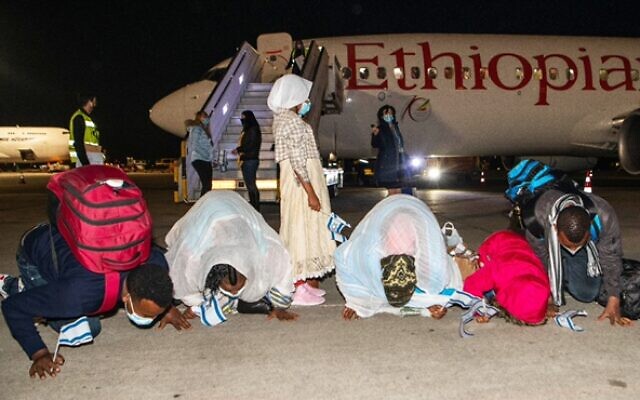COVID Ban on Flights Keeps Out Ethiopian Immigrants
300 Ethiopian Jews had been scheduled to arrive at Ben Gurion Airport as part of a plan that allowed 1,600 new immigrants.

Last week’s ban on passenger airplanes arriving into Ben Gurion Airport, an attempt to control coronavirus variants, halted even incoming planes carrying new immigrants – a first for the State of Israel.
Among those refused entrance were 300 Ethiopians who now are just waiting at Addis Ababa Bole International Airport in Ethiopia, according to Atlantan Gene Rubel. His passion for the Ethiopian Jewish community goes back to several trips he took to the East African country when he was with Atlanta-based Jewish Healthcare International.
By the end of January, the 300 Ethiopian immigrants were to be part of the 1,600 approved entry by an October government decision. Another 400 are scheduled to arrive in February.

Rubel credits Minister of Aliyah and Integration Pnina Tamano-Shata, who originally requested approval of 4,000 immigrants from Ethiopia. “Her biggest problem came from the Treasury,” Rubel said. He explained that the resettlement of Ethiopians is considered more expensive than integrating immigrants from other countries.
On Jan. 22, an Ethiopian Airlines plane bearing more than 150 passengers constituted the sixth flight in the program called Operation Tzur Yisrael, whose goal was to bring 2,000 Ethiopians to Israel in 2020. That flight was financed by Keren Hayesod – United Israel Appeal, which is the official fundraising body for Israel. A Christian Chinese entrepreneur supported the flight, according to The Times of Israel. Now the plan is to complete the mission by mid-2021. The closing of the airport might delay that achievement.
Rubel periodically sends emailed updated to hundreds of people, informing them of the progress of bringing Ethiopian Jews to Israel. “My objective is to let people know what the real situation is,” he told the AJT. “I try to publish what’s happening and a lot of people read what I write.” Much of his information still comes from long-term contacts at The Jewish Agency, which handles relations with the Ethiopian government and has staff on the ground in Gondar and Addis Ababa.
In his latest update, Rubel pointed out that the “October government decision required the Minister of Aliyah [and Integration] to submit a long-term plan for aliyah of the remaining Jewish community in Ethiopia. A draft of the plan has been completed but, in light of the scheduling of new elections [March 23], no further action is contemplated. Under the rules of the interim government, no decisions requiring expenditure of funds is allowed. Further action will need to await formation of a new government after the March election.”
In addition to focusing on the Ethiopians’ actual immigration into Israel, Rubel also spotlights their lives once they are in Israel. He was enthusiastic about a recent Israeli Supreme Court ruling in favor of the Association of Ethiopian Jews that repealed a police identification procedure passed in 2019 allowing police officers to demand an ID card for any reason.

The petition submitted by the AEJ, the Association of Civil Rights in Israel, the Israel Bar Association and the Public Committee Against Torture in Israel had requested the court to prohibit police from detaining people on the street to show identification when there was no suspicion of any crimes being committed.
Rubel is now considering a fundraising effort to raise $25,000 to hire an additional employee for the AEJ.
Separately, the Israel Interior Ministry rejected the rights of the Abayudaya Jewish community in Uganda to make aliyah. The Jewish Agency had recognized the non-Orthodox conversion of several members of the community who had been converted through the Conservative movement.
“We’re profoundly disappointed by the Interior Ministry’s decision,” said Rabbi Jacob Blumenthal, CEO of the United Synagogue of Conservative Judaism and The Rabbinical Assembly, which has a long relationship with the Ugandan Jewish community. “We see it as a profound insult to the Conservative movement,” he was quoted as telling The Times of Israel.
The Interior Ministry’s ruling is part of an ongoing controversy in Israel. The legitimacy of conversion by non-Orthodox rabbis and even some Orthodox rabbis not approved by the ultra-Orthodox Israel chief rabbinate has long been an issue. Reform and Conservative conversions performed within Israel have not been recognized for years.
- Jan Jaben-Eilon
- Israel
- News
- Ben Gurion Airport
- Addis Ababa Bole International Airport
- Ethiopian Jewish
- Pnina Tamano-Shata
- Ethiopian Airlines
- Keren Hayesod
- The Times of Israel
- Minister of Aliyah
- Association of Civil Rights
- Israel Interior Ministry
- Rabbi Jacob Blumenthal
- The Rabbinical Assembly
- Orthodox



comments